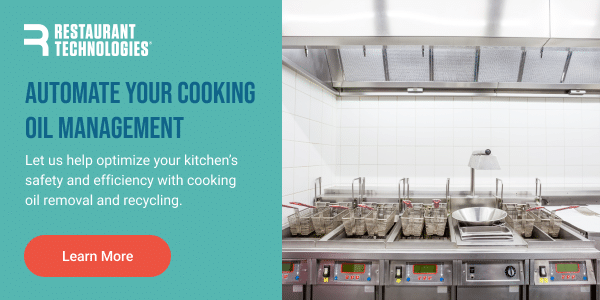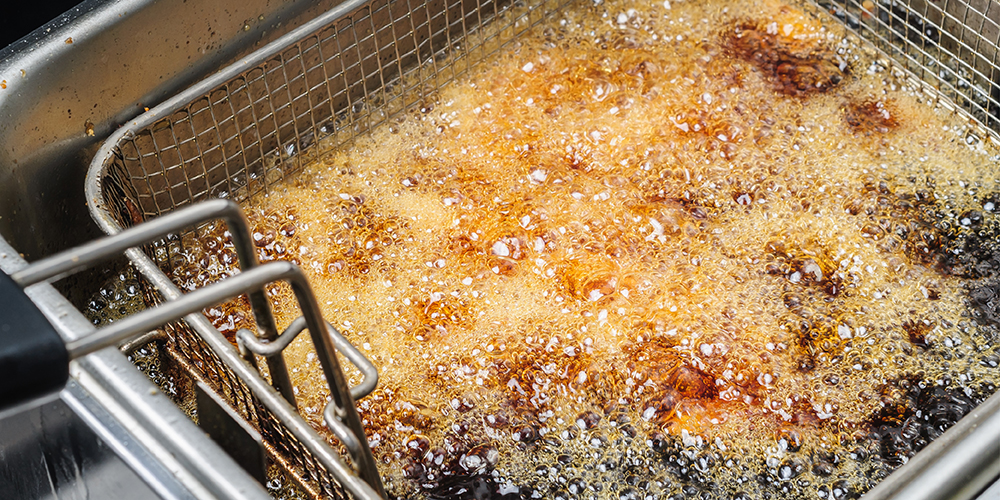Updated 3/6/2025
Cooking oil is a fundamental ingredient in kitchens around the world. Whether you’re frying, sautéing, or baking, it plays a crucial role in countless recipes. But have you ever wondered if bulk cooking oil can go bad or expire? In this comprehensive guide, allow Restaurant Technologies to help you explore the factors affecting the shelf life of cooking oil, address the common question of whether it expires, and provide valuable insights into using it safely.
Does Cooking Oil Expire?
The straightforward answer is yes, cooking oil does eventually expire or “go bad.”1 However, the expiration date printed on the label should be taken with a grain of salt. Cooking oil usually comes with a “best by” or “use by” date, which is an indicator of when the oil is expected to maintain its peak quality. So, it shouldn’t be taken as a strict expiration date. It’s essential to note that this date doesn’t signify when the oil becomes unsafe to consume.
Understanding Cooking Oil Shelf Life
Cooking oil, like any other product, can deteriorate over time. Several factors contribute to its shelf life:
- Oxidative Rancidity: Oxygen exposure leads to the breakdown of unsaturated fats in oil, causing a rancid taste and unpleasant odor.2
- Light Sensitivity: Sunlight can accelerate oil spoilage by promoting oxidation.3 To extend cooking oil’s shelf life, store oil in a dark place.
- Temperature: High temperatures can lead to hydrolytic rancidity, especially in unrefined oils.4 Storing unused oil in a cool place is vital.

How to Tell if Cooking Oil Is Expired
Determining if your cooking oil is past its prime is crucial for maintaining the quality of your dishes. Here are some tips to help you assess its condition:
- Check for Unusual Odors: Rancid oil often emits a strong, unpleasant odor. If your oil smells off or foul, it’s a sign that you may have expired oil.
- Inspect for Off-putting Taste: Taste a small amount of the oil. If it has a bitter or rancid flavor, it’s best to discard it.
- Observe Color and Clarity: Fresh oil should be clear and have its original color. If it appears cloudy or has changed hue, it’s a sign of spoilage.
Expiration Dates & Shelf Life by Oil Type
Many people ask us: Does vegetable oil go bad? Does canola oil expire?
Cooking oils differ in their composition, which affects how long they stay fresh. Understanding the shelf life of various types of oil can help you plan and store them more effectively. Here’s a quick guide to some common oil types and their typical shelf lives:
- Peanut Oil: Peanut oil shelf life can extend to around 1 year if stored in a cool, dark place. Opened, peanut oil should ideally be used within 6-9 months.
- Vegetable Oil: Vegetable oil shelf life can be up to 12 to 18 months when unopened.6 After opening, it should be used within 6 months, but it can last up to 1 year if stored properly.
- Olive Oil: Extra virgin olive oil has a shorter shelf life due to its delicate nature. Unopened, it should be used within 12-18 months for the best flavor and quality.7 Once opened, it is best used within 6 months to a year, but ideally within 6 months to retain the best taste.
- Canola Oil: When stored properly, canola oil shelf life can be up to 12 months unopened.8 Once opened, it’s best to use it within 6 months for optimal quality.
- Coconut Oil: This oil is known for its long shelf life and can last for up to 3 years if stored properly. Once opened, it stays fresh for 1-2 years.9
- Sunflower Oil: Sunflower oil is relatively stable and can last up to a year or more.10
- Soybean Oil: Soybean oil has a decent shelf life, typically around six months to a year.11
- Corn Oil: Corn oil can last for about six months to a year under proper storage conditions.12
By following proper storage guidelines and being aware of the specific shelf life of each oil type, you can extend the freshness and quality of your cooking oils, ensuring better-tasting dishes and minimizing waste.
Can You Use Cooking Oil Past Its Expiration Date?
Using expired cooking oil can pose some risks, primarily related to its quality and taste. While cooking oil past its expiration date may not always be unsafe to consume, it’s important to be aware of potential health effects. Over time, as oil degrades, it can develop harmful compounds that may be detrimental to health if consumed in excessive amounts. These compounds can include free radicals and trans fats, which have been linked to various health concerns such as inflammation, oxidative stress, and an increased risk of heart disease.5 Beyond expiration health effects, some people may experience cooking oil allergies that may worsen if they consume oil past its recommended usage date.
The timeline for when cooking oil becomes unsafe to use after its expiration date can vary depending on several factors, including the type of oil, storage conditions, and the presence of any signs of spoilage. In general, if the oil has been stored properly and shows no signs of rancidity, it can often remain safe for a reasonable period beyond its expiration date. However, as a rule of thumb, refer to this breakdown for safe usage:
- Within a few months: Most cooking oils, when stored correctly, can remain safe and usable for a few months past their expiration date.
- Up to a year: Some oils like vegetable, canola, and soybean oil can remain safe for up to a year or more if stored properly and regularly filtered.
- Longer shelf life: Oils like extra virgin olive oil, when stored in ideal conditions, can maintain their quality for an extended period, even beyond the labeled expiration date.
While this timeline provides a baseline period of safe usage, check oils for spoilage by performing sensory tests if opened before the “best by” date. Consider using oil past its prime for less critical cooking tasks, such as frying or sautéing, rather than for delicate recipes where the oil’s taste could affect the final dish.
Extending the Shelf Life of Cooking Oils
To maximize the shelf life of your cooking oils and make fryer oil last longer, follow these practical tips:
- Store unused oil in a cool, dark place, away from direct sunlight and heat sources. Exposure to heat and light can accelerate oil spoilage. Avoid placing oil near stoves, ovens, or windows.
- Seal the container tightly to minimize exposure to air.
- Consider transferring oil from its original plastic bottle to a dark glass container to prevent light exposure.
- Avoid storing oil near strong-smelling substances as it can absorb odors.
- While it’s in use, filter oil twice daily to remove any food particles and impurities
Restaurant Cooking and Frying Oil: Safety Tips
There are a variety of food safety requirements to account for to keep a kitchen running smoothly, such as how to clean restaurant hood filters. It’s equally important to keep ingredients safe to use, which makes cooking oil management of the utmost importance for restaurants. Cooking and fryer oil is a precious resource that directly impacts the quality of dishes served to customers. To ensure the longevity of your cooking oil and maintain the high standards of your food, follow these additional safe storage and usage practices:
Safe Unused Cooking Oil Storage
- Monitor Temperature: Keep an eye on the storage temperature. Ideally, the storage area should remain at or below room temperature.
- Regular Inspection: Periodically inspect your stored oil for any signs of spoilage, such as changes in color or odor. When it comes to how to test oil quality, simple sensory tests, such as taste and smell, is a good first step to ensure it meets your standards.
Safe Cooking Oil Usage
- Maintain Proper Temperature: Ensure that your fryer operates at the recommended temperature range for the type of oil you are using. Overheating can lead to faster oil degradation.
- Filtering Routine: Implement a regular filtering schedule using the tools provided by Restaurant Technologies, which includes a roll up filter, oil quality test kit, and fryer filtration monitoring. When it comes to how to filter cooking oil, there are a few techniques that Restaurant Technologies recommends that help remove contaminants and extend the oil’s lifespan.
- Proper Frying Techniques: Train your kitchen staff in proper frying techniques, including the use of timers and thermometers to avoid overheating and burning the oil.
- Safe Disposal: When it’s time to change the oil, ensure how you store used cooking oil is safe and responsible. Avoid pouring it down the drain, as it can cause plumbing issues. Instead, collect it in a sealed container and arrange for proper disposal or recycling. Alternatively, check out Restaurant Technologies’ Total Oil Management to automate your oil recycling and removing process.
- Educate Your Staff: Ensure that all kitchen staff are aware of the importance of safe oil handling and storage practices. Consistency in following these guidelines is crucial for maintaining food quality and customer satisfaction, and can help you avoid common issues such as frying oil foaming.
By prioritizing safe storage and usage of cooking and fryer oil in your restaurant, you not only maximize the oil’s lifespan but also contribute to the consistency and excellence of your culinary creations. Keeping your oil fresh and maintaining high-quality food will keep your customers coming back for more, ensuring their satisfaction with every bite.
Common Questions About Cooking Oil
Q: Can I reuse cooking oil?
A: Yes, you can reuse cooking oil, but it’s crucial to filter it to remove food particles and impurities. Frequent filtration can extend the oil’s usability.
Q: How can I dispose of used cooking oil?
A: Avoid pouring used oil down the drain, as it can clog pipes. Instead, collect it in a sealed container and dispose of it in the trash or find a local recycling center.
Q: Does storing oil in the refrigerator help extend its shelf life?
A: Storing oil in the refrigerator can slow down oxidation but may cause it to solidify. It’s best to store it in a cool, dark place instead.
Does Cooking Oil Go Bad or Expire? Understanding Shelf Life and Safe Usage
Cooking oil is a kitchen staple, and understanding how long it is safe to use is crucial for every chef and home cook. While cooking oil doesn’t technically expire by its “best by” date, it can degrade in quality over time due to various factors like oxidation and light exposure. To ensure your dishes taste their best, follow proper storage practices and perform sensory tests if you’re unsure about the oil’s condition.Remember that extending the shelf life of your cooking oils is not only economical but also contributes to the overall success of your culinary creations. So, the next time you reach for that bottle of cooking oil, you’ll be well-informed on how to keep it fresh and flavorful throughout its lifespan. Contact Restaurant Technologies today to learn more about how to keep your kitchen and your cooking safe.
Sources:
- What is the expiration date for cooking oil? (2023, March 23). Ask USDA. Retrieved January 26, 2024, from https://ask.usda.gov/s/article/What-is-the-expiration-date-for-cooking-oil
- Zhuang Y, Dong J, He X, Wang J, Li C, Dong L, Zhang Y, Zhou X, Wang H, Yi Y, Wang S. Impact of Heating Temperature and Fatty Acid Type on the Formation of Lipid Oxidation Products During Thermal Processing. Front Nutr. 2022 Jun 2;9:913297. doi: 10.3389/fnut.2022.913297. PMID: 35719170; PMCID: PMC9201814.
- Danielle Haas Freeman, Collin P. Ward, Sunlight-driven dissolution is a major fate of oil at sea.Sci. Adv.8,eabl7605(2022).DOI:10.1126/sciadv.abl7605
- Rancidity: Causes, Prevention & Effects. (n.d.). Vaia. Retrieved January 26, 2024, from https://www.hellovaia.com/explanations/chemistry/organic-chemistry/rancidity/
- Song J, Park J, Jung J, Lee C, Gim SY, Ka H, Yi B, Kim MJ, Kim CI, Lee J. Analysis of Trans Fat in Edible Oils with Cooking Process. Toxicol Res. 2015 Sep;31(3):307-12. doi: 10.5487/TR.2015.31.3.307. PMID: 26483890; PMCID: PMC4609978.
- How Long Does Unopened Vegetable Oil Last? (n.d.). StillTasty. Retrieved January 26, 2024, from https://www.stilltasty.com/fooditems/index/17812
- Garcia-Oliveira, P.; Jimenez-Lopez, C.; Lourenço-Lopes, C.; Chamorro, F.; Pereira, A.G.; Carrera-Casais, A.; Fraga-Corral, M.; Carpena, M.; Simal-Gandara, J.; Prieto, M.A. Evolution of Flavors in Extra Virgin Olive Oil Shelf-Life. Antioxidants 2021, 10, 368. https://doi.org/10.3390/antiox10030368
- Gariglio, D. (2023, May 1). When Does Canola Oil Go Bad? The Coconut Mama. Retrieved January 26, 2024, from https://thecoconutmama.com/does-canola-oil-go-bad/
- Sherrell, Z. (2023, January 24). Does Coconut Oil Go Bad? Storage Tips and Signs of Spoilage. Greatist. Retrieved January 26, 2024, from https://greatist.com/discover/does-coconut-oil-go-bad
- Gariglio, D. (2023, June 11). When Does Sunflower Oil Go Bad? The Coconut Mama. Retrieved January 26, 2024, from https://thecoconutmama.com/does-sunflower-oil-go-bad/
- Higa, E. (2023, August 30). When Does Soybean Oil Go Bad? The Coconut Mama. Retrieved January 26, 2024, from https://thecoconutmama.com/does-soybean-oil-go-bad/
- How Long Does Corn Oil Last Once Opened? (n.d.). StillTasty. Retrieved January 26, 2024, from https://stilltasty.com/fooditems/index/17797







